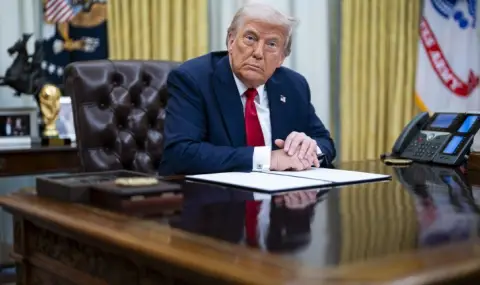US President Donald Trump said he had talks with European and Asian leaders over the weekend about US tariffs.
He answered questions from reporters aboard Air Force One en route from Florida to Washington.
“I've spoken to a lot of European and Asian leaders. They're dying to make a trade deal,“ the head of state said, when asked if he had spoken to any leaders over the weekend about tariffs.
The president was asked if he would allow zero tariffs with Europe, as proposed by Elon Musk, who is in charge of reducing bureaucracy in Washington. “Europe has made a fortune off of us. Europe has treated us very badly. They're coming to the table. They want to talk, but they won't talk until they pay us a lot of money on a yearly basis," Trump said.
He was asked if he had spoken to representatives of the technology sector. "Yes, I'm talking to the biggest in the world. I'm talking to the biggest - a lot of them. I've spoken to four or five that are considered the biggest," the president replied.
He assured that his interlocutors did not blame him for the situation, but refused to specify who exactly he had spoken to. He added that he would check whether their names could be revealed.
Asked about the sharp decline in stock markets, US President Donald Trump said that sometimes you have to take medicine and that he did not intentionally plan the market sell-off, Reuters reported, quoted by BTA.
“I didn't want anything to go down, but sometimes you have to take medicine to fix something“, Trump said.
“We were treated so badly by other countries because we had stupid leaders who allowed it to happen“, the US president said again.
Trump gave no indication of any intention to back down on his plans for high tariffs. “I can't tell you what's going to happen to the markets. But our country is much stronger," he said.
Trump also said he would not make a deal with Beijing unless the US trade deficit with China is resolved. "Unless we resolve that problem, I have no intention of making a deal," he said.
The deal to acquire the assets of the social network TikTok in the US fell through because China renegotiated the terms of the agreement after the US administration imposed additional tariffs on all Chinese products, Trump added.
"We had a deal, or rather we were pretty close to it, but then China changed the terms because of the tariffs," he said, without explaining what terms had been changed. “If I had reduced the tariffs even a little bit, they would have approved this deal in 15 minutes.“
Earlier, Reuters, citing its sources, reported that the deal for TikTok's assets had fallen through. According to the agency, the agreement was approved by the Chinese Internet holding ByteDance, which owns TikTok, and the US government. The deal involves transferring TikTok's operations to a new company based in the US and owned mostly by American investors.
Treasury Secretary Scott Besant told NBC that more than 50 countries had approached the White House after Trump announced the tariffs, asking to start trade talks. “He created maximum leverage“, Besant said.
The stock market decline wiped almost $6 trillion off the value of US stocks after the tariffs were announced. Besant, however, downplayed the stock market decline and said there was "no reason to expect" a recession because of the tariffs, citing stronger-than-expected U.S. job growth.
J.P. Morgan economists, however, estimate that the tariffs will lead to an annual decline in U.S. gross domestic product of 0.3 percent, compared with earlier forecasts for growth of 1.3 percent. They also predict an increase in unemployment from 4.2 to 5.3 percent.
Trading on Asia's largest stock exchange in Tokyo (TSE) began with a collapse in quotes amid investor concerns about the situation with US tariffs.
The key Nikkei index, which reflects fluctuations in the share prices of 225 leading Japanese companies, fell by 6.46% in the first 10 minutes after the opening of the session to 31,596.83 points.
Early futures trading before the opening of the main trading on the TSE was suspended after a drop of more than 8%
The price of Brent oil futures for delivery in June 2025 on the London ICE exchange fell below $64 per barrel for the first time since April 26, 2021.
According to exchange data as of 00:09 Bulgarian time, the price of Brent crude oil decreased by 2.41% to $63.97 per barrel.
As of 00:27 Bulgarian time, Brent futures accelerated their decline and were trading at $63.45 per barrel (-3.25%), while WTI futures for delivery in May 2025 fell by 3.36%, to $59.92 per barrel.
The decline in oil prices continues against the backdrop of OPEC's announcement on April 3 that the eight OPEC+ countries will accelerate oil production growth in May to 411 thousand barrels per day instead of the initially planned 135 thousand barrels per day.
According to experts, this decision corresponds to the balance of the oil market. The situation is favorable enough for the group to return previously reduced production volumes to the market, despite the current price decline.
.
